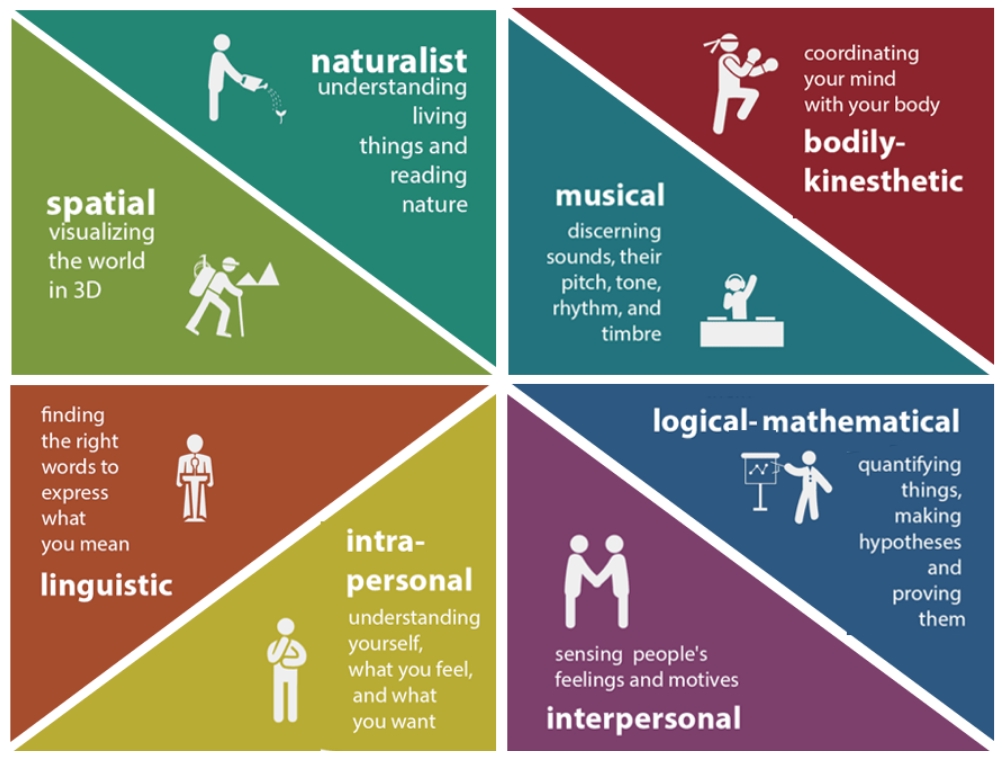Howard Gardner first introduced the concept of multiple intelligences in 1983. His argument states that there is a wide range of cognitive abilities with a weak correlation between them. He believes that individuals have different ways of learning. A method that works for one person will not necessarily be the best method for another. Various mainstream psychologists, for its lack of empirical evidence, have criticized the theory. Many teachers, in a quest to accommodate all students, implement the concept successfully in their classes and believe it helps them to differentiate in their teaching, planning, and developing homework and tests. The article will look at the types of intelligence suggested by Gardner.

Visual-Spatial Intelligence
People in this category will be good with visualizing. They are usually good with maps, directions, charts, and pictures. Recognizing patterns will be easy for them and they will find it easy to put puzzles together. Visual people enjoy drawing and painting, but also enjoy reading and writing and learn best through diagrams, drawings, and other visual aids. Architecture, graphic design, photography, and fashion design are possible career choices.
Linguistic-Verbal Intelligence
Individuals strong in this area use words well, in both writing and speaking. They are good storytellers and use humor when telling their tales. These people find reading and writing enjoyable and are good at explaining things. Debating is one of their strong points, and they have the ability to be persuasive. They learn best by taking notes and reading. Possible careers include teaching, law, writing, and journalism.
Logical-Mathematical Intelligence
Reasoning, problem-solving and pattern recognition come easy to these individuals. They enjoy thinking about problems and abstract concepts. People in this category enjoy scientific experiments and are good with complex calculations. Obvious career choices will be engineering, mathematics, and science. Accountants and computer programmers also fall into this group.

Bodily-Kinesthetic Intelligence
Teachers might recognize children from this group as the ones having difficulty sitting quietly for long periods. People with this type of intelligence have good coordination and dexterity. Their hand-eye coordination is usually excellent. They remember better when doing things than when seeing or hearing it. Dancing, building, art, and drama are good career choices for this group.
Musical Intelligence
Rhythm and sounds are strengths for this group. They enjoy playing musical instruments and are very good at recognizing patterns and tones. These individuals remember songs and melodies easily. They learn best by using rhythm and music to remember information. Possible career choices include music teacher, conductor, songwriter, and composer.

Interpersonal Intelligence
Individuals in this group have a special ability to understand other people and easily relate to them. They are sensitive to the emotions and perspectives of those around them. People in this group easily make friends and are good at working in a group. Their verbal and non-verbal communication skills are well developed and they can easily create positive relations with others. Possible careers include childcare, sales, counseling, social work, and politics
Intrapersonal Intelligence
This group is good at understanding themselves. They tend to spend time on self-analysis and reflection. Daydreaming is another characteristic, and they know their own strengths and weaknesses. They learn and work better on their own and can be introverts and perfectionists. Theology, dissertation layout writing, science, and philosophy are possible career choices.
Naturalistic Intelligence
A person in this intelligence is sensitive to nature. They enjoy growing and nurturing and interact well with animals. Camping, hiking, and walking are favorite activities for these individuals. They are more concerned about pollution and other environmental problems than others are. Careers in the fields of zoology, botany, ecology, and science are good options.

Most teachers have seen all these different bits of intelligence in front of them at some point in their career. Gardner’s theory might not be flawless, but many will be able to recognize themselves in one of these groups. You might be stronger in one group, but it does not mean you do not have access to any of the others. Some people will find their strength is usually in one specific area while others might feel they have strengths in more than one area.

